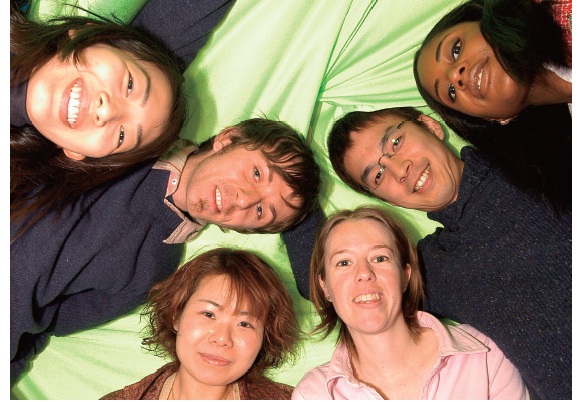English-speaking volunteering in Tokyo
IN RECENT years, volunteering has had an image makeover. The advent of the internet means volunteers are no longer likely to be stuffing envelopes in a drafty church hall; they’re more likely to be organizing events, campaigning, designing websites or writing press releases. Volunteering has different attractions for everyone; as well as the fulfillment offered by helping a worthy cause, it can be a way to meet new people, discover new parts of Tokyo and develop skills. For people teaching English volunteering can provide a relief from the monotony of the classroom, and may even be a step towards finding a job in a different area.
Suzy Small interviewed volunteers from four different organizations in Tokyo to find out about the kind of work they do, how they got involved and what drives them on to continue volunteering.
Katherine Butcher
Oxfam Japan
WEEKENDER: How did you get involved with Oxfam Japan?
BUTCHER: I moved to Japan five months ago, because my partner was transferred here for work. When I first arrived I wasn’t working, so was really interested in doing some volunteer work. Oxfam appealed because I didn’t need to speak Japanese and the time commitment was flexible. I really feel strongly about the work that Oxfam does too — it’s an international organization that works in the developing world to end poverty and global inequality.
What kind of volunteering have you been doing?
I’m the main point of contact for all the English-speaking volunteers in the Oxfam office. I look after about 20 volunteers, allocating tasks and handling enquiries. We’ve been working on an educational pack for teachers, and a fundraising kit, as well as organizing events. Since the Asian tsunami we’ve been busy trying to help supporters organize and promote fundraising events.
How much time do you spend at Oxfam?
I’m in the office in Ueno two days each week. At first I spent more time here, but then I began teaching English four days per week. I didn’t want to give up the Oxfam work, though, so I still manage to squeeze it in.
What have you found difficult about your work?
The most difficult thing has been not speaking Japanese. It can be hard when trying to research locations for events, and also using the Japanese computers is a challenge — although I’m getting better! Luckily there are plenty of Japanese volunteers at Oxfam who speak good English, so I can always ask them for help.
What has been rewarding about the work you’ve done?
The best thing is the atmosphere in the office and the people I’ve met — not just the Japanese staff and volunteers, but also other volunteers from all over the world. We have a great time, and I really enjoy the interaction — there’s always a lot of laughing and joking. I feel like the work I’ve done for Oxfam has really helped me develop my skills and confidence.
Iona MacNab
La Leche League
WEEKENDER: How did you begin volunteering for La Leche League?
MACNAB: When my oldest son was a baby, a friend introduced me to La Leche League where I met some other mothers who had little babies who were breastfeeding. I originally thought LLL was only for mothers with breastfeeding problems, but I found out it was a place to discuss not only breastfeeding but also other aspects of mothering a breastfed baby. I subsequently became an accredited LLL leader, had a further two children, and have been helping foreign mothers and babies as a volunteer in Tokyo for the past eight years.
What does La Leche League do?
The LLL mission is to help mothers worldwide to breastfeed through mother-to-mother support, education, information and encouragement, and to promote a better understanding of breastfeeding as an important element in the healthy development of the baby and mother.
What kind of volunteer work do you do at LLL?
Together with my other volunteer co-leaders at the LLL Tokyo Central group, Vicki and Kathryn, we run monthly meetings for pregnant and breastfeeding mothers and babies, answer phone calls and emails about breastfeeding questions, and we also need to read a lot in order to keep up to date with pertinent breastfeeding information. I also work as a support administrator within the international division of LLL.
How much time do you spend volunteering for LLL?
I really love what I do, and I spend about 25 hours a week on LLL work, squeezed in around family and other work commitments.
What have been the high points — why do you enjoy volunteering?
My husband often wishes I could get paid for the volunteer hours I put in (he seems to think we would be rich!) but my personal wealth cannot be measured in terms of money — when a mother calls me to say breastfeeding is going better now, it makes me feel I get far more from my volunteer work than money could ever buy!
Have there been any challenges?
Keeping our group’s focus on breastfeeding can sometimes be challenging, when mothers have so many questions about other topics, from birth to immunizations to schooling, but the singleness of purpose helps us focus on what we do best, which is offer information and support for breastfeeding.
Do you have any advice for people who are interested in volunteering in Tokyo?
Volunteering contributes to a greater sense of belonging when you are in a foreign community, whether you are volunteering with other foreigners or with Japanese people. I think, unexpectedly, we gain much more than we imagine.
Laura Coulter
Your Clothes Friend
WEEKENDER: What kind of volunteer work do you do?
COULTER: I decided to organize a clothes-swapping event because I wanted to gain experience in event planning and decided to combine this with fundraising.
I had the idea of doing a clothes swap because so many Western women in Japan have trouble finding clothes that fit them properly. It’s also hard to get rid of unwanted clothes, because there aren’t charity shops here like in other countries. A clothes swap seemed to be the perfect solution — you can get rid of old clothes, find some new ones, meet people and raise money for charity all at once!
How did the event go?
The first Your Clothes Friend event was held in December last year. Every girl who came took something away with them — some had a whole new wardrobe by the end of the event. Any clothes that were left over, I donated to charity. I am now organizing a second swap, which will be held on Apr. 17 at Cozmo’s Cafe.
What were the hardest things about organizing the event?
At first I was worried that there wouldn’t be enough clothes, but it turned out to be the opposite; there were 16 garbage bags of clothes left at the end of the event! I had to take them back to my apartment until I could arrange for the charities to collect them. Also, some people brought old clothes that weren’t really suitable for swapping; things that were discolored or damaged.
How has your volunteer work benefited you?
Organizing the Your Clothes Friend swap was fun and gave me good insight into planning an event. I think that the foreign community in Tokyo is quite receptive to new ideas — I would encourage anyone with a good idea to put it into action!
Patricia Decker
Second Harvest Japan
WEEKENDER: How did you become involved with Second Harvest?
DECKER: When I first came to Japan I was working on the JET Programme, and I was keen to get involved in my community here, but was looking for something where it wasn’t necessary to speak perfect Japanese. A friend of mine was volunteering at Second Harvest. She brought me along one day, and I’ve been coming back ever since — for almost two years now.
What kind of volunteering do you do?
On Saturday mornings I come to the Second Harvest warehouse near Akihabara. With the other volunteers, I prepare hot food and divide portions of other groceries to be distributed to homeless people. Once everything is ready, we load it all into the van and go to Ueno and Asakusa to distribute it, usually to over 400 people.
lthough Saturday is the busiest day for volunteers at Second Harvest there is something happening on just about every day of the week. About 20 percent of our food goes to homeless people, and we distribute the rest to agencies like women’s shelters and orphanages. We provided 400,000 meals in 2004, and on average we distribute 400 kilos of food each day.
What do you enjoy about volunteering?
I really like the immediacy of what we do — you prepare food, you give it to someone who’s hungry, they eat it. It’s as simple as that, but it’s a really good feeling to know that when I finish on a Saturday morning there are people who are feeling better than they would have otherwise. Also, all of our food is donated from companies that would otherwise throw it away. I’m always impressed at the impact of redistributing even a small portion of what would have been waste.
What can be difficult?
Second Harvest Japan is a young NPO, so we are always working out the best way to do things. Having said that, it’s nice to see that during the time I’ve been volunteering here things have gotten much more efficient. At first we didn’t have a warehouse, and we didn’t prepare hot food, but the process has become much more refined. We now prepare different types of foods, depending on if the people we’re giving them to have cooking facilities or not. We’re constantly working on how to make things better — improving our recipes and the way we run the organization.
TIPS FOR SUCCESSFUL VOLUNTEERING
• If you are interested in volunteering, take some time to think about how much time you can spare, what your skills are, and what kind of causes you feel passionate about. You’ll enjoy the experience much more if you feel your skills are being well used.
• Also, consider what you want to get out of volunteering — do you want to learn new skills, gain experience in an area you’re interested in, or meet new people? This will help you find an organization that is a “good fit” and maximize the enjoyment and satisfaction you get from volunteering.
• When you begin, don’t be afraid to ask lots of questions until you feel like you understand what’s expected of you.
• Be punctual and dependable — even though you are not being paid, people will be relying on you.
• Be brave — if you can’t find an organization that fits your schedule or interests you can always organize your own event.
VOLUNTEERING DIRECTORY
The following organizations all appreciate English-speaking volunteers. Whether you have a couple of spare hours a month, or a couple of days a week, in a city the size of Tokyo there is sure to be a charity that can use your skills.
OXFAM JAPAN
Needs a co-ordinator for English-speaking volunteers who can come into the office one or two days per week. It also needs volunteers to help with fundraising, especially from people who are able to independently organize events to raise money to support its work in developing countries. [email protected], www.oxfam.jp.
SECOND HARVEST JAPAN
Always welcomes volunteers to help out on both weekends and weekdays. No language skills are necessary and any amount of time is appreciated. People with Japanese driver’s licenses and translation abilities are particularly needed. [email protected], www.2hj.org.
TOKYO ENGLISH LIFE LINE
Has been providing free telephone counseling for the international community in Tokyo since 1973. TELL has opportunities for people to work in fundraising or to train as telephone counselors. www.telljp.com
LA LECHE LEAGUE
Encourages pregnant and nursing mothers to attend meetings at one of the Tokyo LLL groups and/or consider becoming members. Email [email protected] (for details of Tokyo LLL meetings or for memberships or donations). www.lalecheleague.org/Japan.html
TOKYO UNION CHURCH RICE PROJECT
Makes onigiri to feed about 200 homeless people in Tokyo. Volunteers are needed Sunday afternoons and weekday mornings to help make and distribute rice. If you are interested in volunteering, contact Ikuko Omori for production: [email protected], 090-2730-4277, or Marianne Wada for delivery: [email protected], 090-4742-1460.












